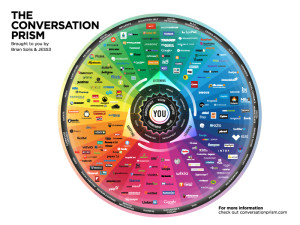I was at The Annual Conference on Distance Teaching and Learning last week. The conference seems to get better each year, and I needed the weekend to think a little deeper about what I saw and heard. This here, is both a prompt and a reminder (so that I don’t forget what I saw, and work on the projects that I want to).
As usual, several of the participants used Twitter for back-channel conversations. This became a useful tool to aggregate comments and resources via the #UWdtl hashtag. Hopefully more participants get onboard next year.
Speed Sessions
I managed to catch a couple of Speed Sessions Tuesday afternoon, only the last four, but these were helpful. The “speed” part of the speed sessions was hurt a little when presenters had difficulty getting their laptops to work with the HDMI connection to the projector in the room, but luckily those with recalcitrant laptops were able to borrow working MacBooks. Of the four sessions that I saw, Moses Wolfenstein‘s “Finding a Place for Gamification in Learning” was the most entertaining, but Laura Bunte of Stratagem had some very useful formulae and templates to share for projecting the cost of developing online content.
Information Sessions
I was lucky enough to see a series of information sessions that met my interests and needs:
- “Using Game Design Theory To Develop A Faculty Self-Assessment”
- Susan Manning shared four game design elements (story, mechanics, technology, and aesthetics) that could be used by instructors to help inform their instructional design.
- “Social Media in Education: So Many Choices!”
- Ronald Hannaford posited that Social Media in Education has many of the same amorphous aspects of online learning fifteen years ago. I particularly liked the Conversation Prism image he used. He suggests a strategic plan for campus-wide integration.
- “Are Games And Simulations A Good “Fit” For Your Curriculum”
- Penny Ralston-Berg demonstrated some great examples and games. The one I will be looking at in more detail is Quizlet.
- “Voice And Screencasting Feedback”
- John Orlando started his session with my favorite video of the conference (Hexaflexagons). More interestingly, he shared research on the amount of time some faculty spend on student feedback – more on textual feedback, and less on audio feedback. However, the audio feedback contains more “words,” so is both more efficient and more detailed. I am pondering running some research along these lines at work.
- “MOOC Development And Delivery From The Support Staff’s Perspective”
- Hui-Lien (Sharon) Hsiao and Norma Scagnoli shared their processes, challenges, and merits of facilitating courses at the University of Illinois at Urbana-Champaign. I am very, very curious to see how these business courses pan out.
